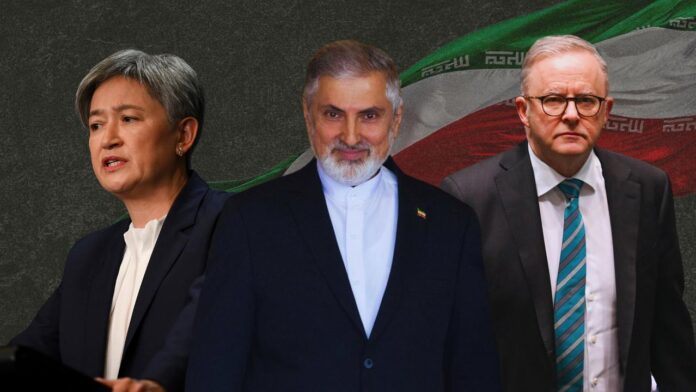For the first time since the Second World War, Canberra expels a foreign envoy, accusing Iran of clandestinely fuelling sectarian violence on Australian soil.
The Australia expels Iranian ambassador decision, announced on August 26th by Prime Minister Anthony Albanese, marks a profound diplomatic rupture, and a dangerous new chapter in the blurred boundaries between foreign espionage and ideological warfare. According to intelligence services, the Islamic Republic of Iran directly orchestrated at least two anti-Semitic attacks in major Australian cities over the past year. For a country generally allergic to geopolitical drama, this response signals the kind of deep-state alarm that Canberra prefers to suppress rather than broadcast.
And yet, the implications cannot be ignored. For Iran, the reach of its influence seems no longer confined to the Middle East’s proxy theatres. For Australia, a liberal democracy long resting on the illusory comfort of geographic isolation, the confrontation suggests something darker: that hostile regimes now consider Western civil societies viable battlegrounds for covert ideological disruption.
A Kosher Café in Sydney, A Synagogue in Melbourne: Tehran’s Alleged Targets
Prime Minister Albanese stated the conclusion was “deeply disturbing”: Tehran, via operatives or proxies, directed two arson attacks, one targeting the Lewis Continental Café, a kosher establishment in Bondi (October 2024), and another striking the Adass Israel Synagogue in Melbourne (December 2024). Neither attack caused physical injuries, but the symbolic weight is unmistakable. These weren’t random hate crimes, they were, according to Australian intelligence, foreign-orchestrated acts of psychological warfare aimed at undermining Jewish communities and fracturing the nation’s social cohesion.
“These were extraordinary and dangerous acts of aggression,” Albanese declared, pointedly framing them as acts of war by stealth. “It is totally unacceptable.”
From a geopolitical standpoint, it’s worth reading between the lines: the attacks were not random, they targeted institutions with deep cultural and religious significance. Iran’s goal, if the accusations hold, was not destruction per se, but division. A soft destabilisation strategy.
Persona Non Grata: A Rare Expulsion with Global Echoes
Iran’s ambassador Ahmad Sadeghi and three other officials were declared persona non grata and given seven days to leave. It is a move unseen since World War II, underscoring the gravity of the situation. Concurrently, Australia withdrew its ambassador to Iran and suspended operations at its embassy in Tehran, a diplomatic freeze that leaves little room for ambiguity.
Foreign Minister Penny Wong, often the government’s voice of careful restraint, used unusually stark language: “Iran’s actions are completely unacceptable.” In international diplomacy, that level of finality is rarely uttered without careful consideration. Clearly, what Canberra discovered rattled even the most cautious bureaucrats.
What makes this expulsion even more consequential is Australia’s decision to legislate the Islamic Revolutionary Guard Corps (IRGC) as a terrorist organisation. A symbolic gesture? Perhaps. But it carries immediate implications for sanctions, intelligence-sharing, and foreign asset seizures.
A Calculated Escalation or a Message to Washington?
What remains unclear is the broader strategic calculus behind Australia’s unusually muscular stance. Canberra is hardly a lone actor—this move aligns perfectly with recent Anglo-American posturing against Iran. In July 2025, Washington stepped up clandestine operations targeting IRGC-linked cyber units. The UK, meanwhile, has already classified the IRGC as a terror group.
So is this Australian response a sovereign initiative based on domestic intelligence? Or is it part of a broader Five Eyes intelligence network alignment, nudging Australia into a firmer Atlanticist posture after years of regional ambiguity?
There’s a deeper unease beneath the official narrative: if Iran is willing to strike this far afield, through low-tech, high-symbolism attacks, what other Western countries are already within range of its long ideological arm?
Iran’s Silence, and the Fog of Hybrid War
Tehran has, so far, remained silent, neither confirming nor denying the accusations. In typical Iranian fashion, the regime appears to be waiting, watching, gauging the international response. It knows the game well: deny, deflect, distract.
But this silence should not be mistaken for weakness. Iran’s hybrid warfare doctrine, a murky blend of cyber operations, disinformation campaigns, and diaspora manipulation, is designed precisely to remain deniable, untraceable, and asymmetrical.
The risk for Australia—and other Western democracies, is that we are entering a new era of ideologically motivated low-intensity conflict. Where the enemy is not marching through borders but lighting fires in cafés. Where war is waged with ambiguity, and defence requires not just armies but resilience, surveillance, and a clear-eyed understanding that multicultural harmony cannot be taken for granted when foreign regimes see division as a weapon.



